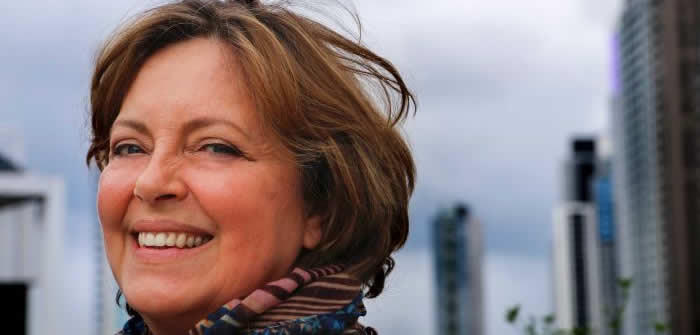From lead roles in Hollywood to the stages of Paris, Greta Scacchi’s acting career has taken her around the world.
But the 57-year-old is particularly fond of the cinema of Italy, where she was born.
I think that, as in many countries in the world, Italy is in a period of change,” Scacchi told RN Drive.
“There’s been a struggle with economic pressures and with the pressures of informal immigration.
“Because of the shifting identity of Italy, and the difficulties that people are suffering there, the cinema is beginning to produce a kind of new neo-realism that’s as gritty and real and good as some of their post-war cinema.”

Reverence for art and culture
Scacchi, who is an ambassador for the Italian Film Festival, which is touring capital cities, believes that there is an open reverence for art, academia and culture in Italy, which leads to a very different sort of film than those produced by major Western studios.
“When you watch Italian films it’s very engaging, because you must engage with them,” she said.
“You are requested, as an audience, not to just lie back and have the thing wash over you — you have to think and apply yourself and then you’ll find it’s very rewarding.
“It [Italian cinema] doesn’t necessarily answer all the questions; the stories can have some inconclusive quality, but that is their truth — not all questions can be answered and things aren’t black and white.”
Though she is best known for her work in Hollywood films like Presumed Innocent and The Player, for Scacchi those projects were a means to an end — a chance to return to the roles she truly loved in Europe.
“I didn’t go to Hollywood until I really had to,” Scacchi said.
“European film directors wanted me for a project, but the producers and the money people decided they had to go for a bigger American name.
“When that happened to me the third time, I went to the [United] States.”
After two weeks in Los Angeles, Scacchi said she was offered a role in Presumed Innocent.
“So that was the ticket that I needed to get into their kind of American market,” she said.
“I soon ran away … I didn’t like it very much.”
Different on-set cultures
Scacchi’s long and varied career has seen her take roles in everything from Australian favourites like Looking for Alibrandi, to period dramas like Emma, alongside the likes of Gwyneth Paltrow.
Having worked on films around the world, she believes that each country has its own distinct culture on set, and America’s is the most hierarchical.
“The star system is their form of monarchy,” she said.
“I remember when I first walked onto a film set in America and nobody was allowed to look Harrison Ford in the eye.”
Yet, when starting out in England, Scacchi was told of the importance of knowing everyone on set.
“In America there was no chance to do that because if you ever met eyes with the focus puller, he would look down at the ground,” she said.
When she began working in Italy, Scacchi found that it was necessary to become more distant for her own protection.
“In Italy, when I applied this technique of getting to know the names of the focus puller or the clapper loader, by day three they were saying ‘come here and give me a kiss’ or ‘why don’t you sit on my lap’, and I realised that in Italy if you are a lead actor, you don’t say hello to everybody,” she said.
“They don’t want you to be familiar — they want you to be just a little more on a pedestal.”
And again Scacchi explained her experience of working in Australia was different yet again.
“In Australia, of course that wouldn’t go down at all well,” she said.
“Everybody here is the same, it’s democracy, it’s egalitarian, and I actually like that environment most of all.”
Source: ABC


